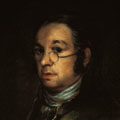








In the pictures of this collection we have learned something of the work of Michelangelo as a sculptor and a painter. He was an artist whose personality was so strongly impressed upon his work that we have come thus to know, to a certain extent, the man himself. His, as we have seen, was not a happy nature, and many of the circumstances of his life conspired against his happiness.
In his early youth he seemed strangely aware of his own superior gifts and was often so overbearing that he made enemies. The story is told of a quarrel he had with a young man named Torrigiano, in whose company he was copying some frescoes in a church in Florence. Stung by some tormenting words of Michelangelo, Torrigiano retaliated with a blow of the fist, which crushed his companion's nose, and disfigured him for life.
Michelangelo's real education began in the palace of Lorenzo the Magnificent, who discovered the lad's talent and made him a favorite. "He sat at the same table with Ficino, Pico, and Poliziano, listening to dialogues on Plato, and drinking in the golden poetry of Greece. Greek literature and philosophy, expounded by the men who had discovered them, first moulded his mind to those lofty thoughts which it became the task of his life to express in form. At the same time he heard the preaching of Savonarola. In the Duomo and the cloister of S. Marco another portion of his soul was touched, and he acquired that deep religious tone which gives its majesty and terror to the Sistine."[37] In the gardens of S. Marco he had Lorenzo's fine collection of antiquities to study, and learned from them the secrets of Greek sculpture.
[37] Symonds, in Renaissance in Italy: The Fine Arts.
In all these opportunities it would seem that Michelangelo was a most fortunate person. Nor did he lack proper appreciation; the Pietà placed him at once on a pinnacle of fame, and the David was heartily admired.
It was when he entered the service of the Pope that his troubles began. He was never thereafter a free man. His genius was at the disposition of a series of men, each ambitious for his own fame, and caring little for the artist's personal aspirations. His proud nature was bitterly humiliated by this sacrifice of his independence. Sometimes he openly rebelled, but in the end was always obliged to yield to papal authority.
Michelangelo's sternly upright spirit found also much to sadden him in the corruption of the times. He was a lover of righteousness as well as a lover of liberty, and he greatly mourned the evils which surrounded him.
One of the pleasantest traits in his character was his warm affection for the members of his family and for the few whom he honored with his friendship. One of the latter was Vittoria Colonna, a woman of strong and beautiful character, who brought much brightness into his life.
Our portrait shows him somewhat past middle life when occupied with many important concerns. We can read in the face something of the character of the man. It is certainly not a handsome face, for any good looks he might once have boasted were destroyed by his broken nose. It is nevertheless a face full of rugged strength, with not a little kindliness in the expression. Here is a man whose enmity we should avoid, but whose friendship we should value above rubies.
It is the face of a lonely man. Michelangelo had to suffer the loneliness of genius. No one could fully understand him. He stood apart, towering like a giant above his fellow men.
On the four hundredth anniversary of Michelangelo's birthday, some verses were written by an American poet, Christopher Cranch, which one should read while looking at this portrait:—
The poet describes still further the artist's character, and then enumerates some of his great works. Whatever occupied him—